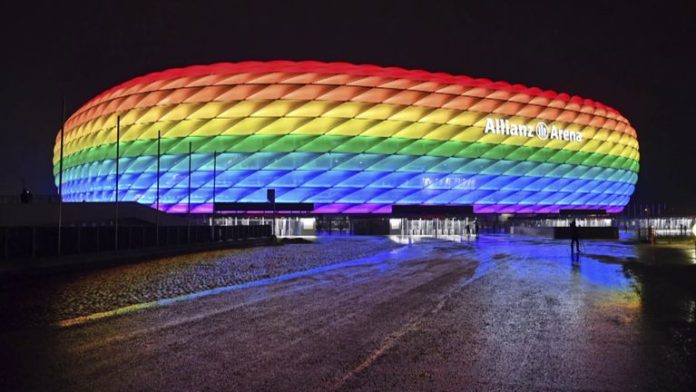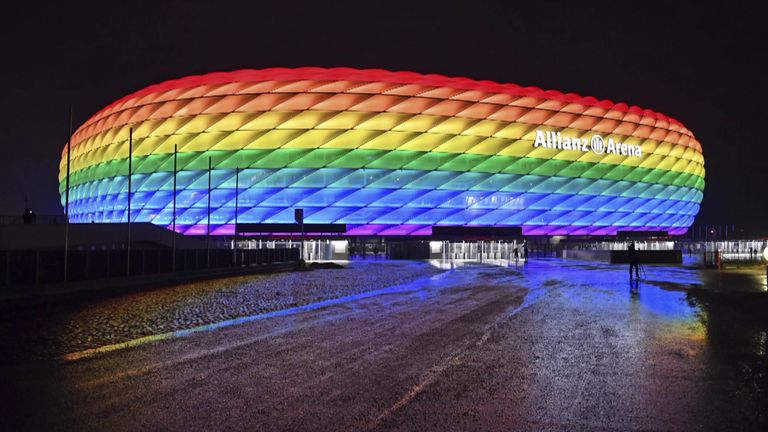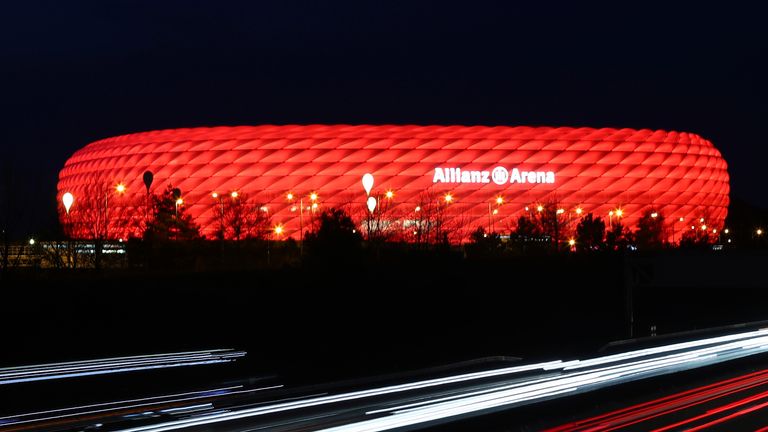LGBT+ groups have written to UEFA president Aleksander Ceferin criticising inaction over potential discriminatory incidents during Hungary’s first two Euro 2020 games and the decision to prohibit the Munich Stadium from being illuminated in rainbow colours.
The letter has been organised by the Football v Homophobia campaign and includes Pride in Football (the UK umbrella organisation for LGBT+ supporters groups), the EGLSF (European Gay & Lesbian Sport Federation) based in the Netherlands, and the Civil Works Association in Hungary.
UEFA is investigating potential discriminatory incidents during Hungary’s opening two matches of Euro 2020 at the Puskas Arena in Budapest. The inclusivity in football group Fare sent a report highlighting a homophobic banner in the stands for their defeat to Portugal, while monkey chants were also heard during the draw with France.
On Tuesday, UEFA denied a request from the German Football Federation and Munich’s mayor Dieter Reiter for the Allianz Arena to be lit up in rainbow colours for their clash with Hungary in Group F on Wednesday because of the political motives behind the proposal.
Reiter had said he wanted to light up the stadium in the colours in protest against a new law in Hungary that bans the dissemination of content in schools deemed to promote homosexuality and gender change. UEFA has proposed new dates for the stadium to be illuminated.
Leading LGBT+ groups in Germany, Turkey, Poland, Portugal, France, Slovenia, Russia, Finland, Spain and Italy have also signed the letter which hits out at UEFA for a lack of “action” concerning the alleged incidents at the Puskas Arena.
The organisations also say it is “simply wrong” of UEFA to deem gestures aimed at challenging LGBT+ discrimination to be political acts.
The letter read: “Dear Mr Ceferin, President of UEFA. We are an independent grouping of LGBTIQ community groups concerned with combatting homophobia in football, using football and other sports as a tool to tackle discrimination, and working with LGBTIQ groups to overcome exclusion of our communities across Europe.
“We write you as the head of UEFA about our general concerns at the rise of homophobia in football in many countries within UEFA jurisdiction in recent years and also about the Euro 2020 tournament.
“We have been alarmed by examples of homophobia during Euro 2020 with banners and chants in evidence in some stadiums. Most notably we have been concerned about the way in which supporters of Hungary have been using their government’s legislative framework to sing songs and raise banners mocking and denying the rights of the LGBTIQ community to exist.
“I am sure you will agree that the human rights of minority groups are to be respected within civil society, and any examples of those rights being challenged within popular public arenas, such as football matches, should be acted upon.
“We have not as yet seen any action from UEFA on the incidents widely reported in Hungary.
“We welcomed the initiative of the German Football Association (DFB) and the Mayor of Munich to light up the Allianz Arena before and during the Germany v Hungary match. We also noted the UEFA statement as to why the gesture would be seen as political in opposition to the stance of the Hungarian government.
“We are firmly of the view that positive gestures of inclusion that are in support of the human rights of a minority group that is widely excluded from football and society should not be seen as a political act.
“It is certainly not an act on equal terms with the prohibitive and exclusionary legislation of the Hungarian government. To make an equivalence between the two positions and to reduce this to a political row is quite simply wrong.
“We have noted the UEFA commitment to your own Equal Game campaign; this is an opportunity to put that campaign into practice. We urge UEFA to do more, and to work with partners, such as the Fare network and those of us among this grouping with an international remit, to ensure that actions of inclusion and solidarity are not prevented, and that action on homophobia and LGBTIQ exclusion matches the words of campaigns and pledges.”
In response to the letter, UEFA have defended their actions and reiterated that the request to illuminate the Allianz Arena in rainbow colours carried political motives.
A statement read: “Today, UEFA is proud to wear the colours of the rainbow. It is a symbol that embodies our core values, promoting everything that we believe in – a more just and egalitarian society, tolerant of everyone, regardless of their background, belief or gender.
“Some people have interpreted UEFA’s decision to turn down the city of Munich’s request to illuminate the Munich stadium in rainbow colours for a EURO 2020 match as ‘political’. On the contrary, the request itself was political, linked to the Hungarian football team’s presence in the stadium for this evening’s match with Germany.
“For UEFA, the rainbow is not a political symbol, but a sign of our firm commitment to a more diverse and inclusive society.”
Ceferin then defended UEFA’s stance over the incident, claiming European football’s governing body does not want to partake in “populist actions”.
“You know very well that UEFA is not a homophobic organization. And I personally am not either, of course. We have shown that often enough,” the Slovenian told German newspaper Die Welt.
“But we don’t want to be used in populist actions, that’s the only reason why we made this decision. Because of the popularity of soccer, too often people try to abuse sports organizations for their own purposes.”
UEFA also changed its logo on social media to a rainbow-coloured surround.
Sky Sports News have also given UEFA the opportunity to partake in an on-camera interview.
In recent days, European football’s governing body launched an investigation into Manuel Neuer wearing a rainbow-coloured armband for Germany’s opening two fixtures at the tournament.
However, the review was swiftly dropped on the grounds that the gesture was “assessed as a team symbol for diversity and thus for a ‘good cause'” and it therefore did not breach UEFA’s rules surrounding political protests.
The goalkeeper had been wearing the armband in support of the LGBT+ community during Pride Month which runs throughout June.
Belgium hit out at UEFA over LGBT+ stance
Belgium’s captain Eden Hazard will wear rainbow colours on his armband at the Euros on Sunday and the country’s football association are considering further ways to show solidarity with LGBT+ people.
Spokesman Stefan van Loock said: “We totally disagree with the UEFA decision and are probably going to play on Sunday with a rainbow band.
“If they say themselves that they are for integration, equality, and transparency, then it would have been the appropriate way to display it.
“We are considering how we can all display the rainbow colours in our match on Sunday, but our captain will have it on his armband.”
A large rainbow-coloured banner displayed alongside the Belgian association’s badge was prominently flown at the entrance to the teams training camp in Tubize, some 25km south of Brussels, on Wednesday.
Van Loock added: “We won’t, unfortunately, get to see any stadium in rainbow colours today so a flag at our training complex was the least we could do to symbolically show that we are not in agreement, at all, with what UEFA have decided.
“UEFA should have allowed the rainbow colours to be displayed at the German stadium.”
Bayern Munich president Herbert Hainer has said he would have liked his club’s stadium to be illuminated for the Germany versus Hungary match, adding: “Open-mindedness and tolerance are fundamental values that our society and FC Bayern stand for.”
Other Bundesliga clubs such as Borussia Dortmund and RB Leipzig expressed their support for the LGBT+ movement in social media posts on Wednesday, while Real Madrid, Barcelona and Juventus did too.
A number of footballers, including France’s Antoine Griezmann who tweeted an image on Tuesday of the Allianz Arena in rainbow colours, have also shown solidarity with the LGBT+ community.




